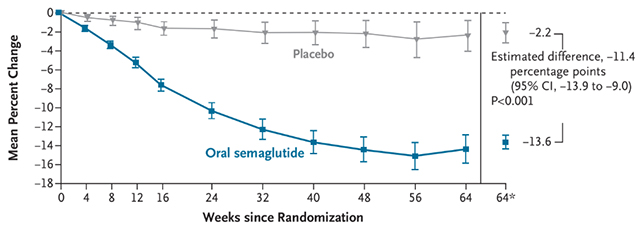Under brand names like Wegovy and Ozempic, semaglutide assists weight loss and manages diabetes through a series of weekly injections.
Unfortunately, the small sting that's required with every dose can dissuade many from considering the medication as an option. A new clinical trial suggests a pill form could soon be a viable alternative.
Semaglutide is currently administered through a weekly dose of up to 2.4 milligrams injected into the layer of fat over the stomach, thigh, or the back of the upper arm. Taking a drug in a pill form means less of the drug gets into your system compared with an injection (the subcutaneous method).
Related: A Type of Fiber May Have Weight Loss Benefits Similar to Ozempic
An international team of researchers investigated the effects of taking 25 mg of semaglutide daily in tablet form to see if it could work as well as injections.
"The reasons patients may prefer oral administration over the subcutaneous route are most often needle aversion and local skin reactions," write the researchers in their published paper.
"In addition, unlike injectable agents, oral agents may not require a refrigerated chain of delivery and could widen the reach of obesity care in many regions of the world where a lack of refrigeration represents a barrier to access."

The trial involved 205 people being given semaglutide and 102 people a placebo, alongside diet and exercise counseling for 71 weeks. All of the participants, across four countries, were classed as being overweight at the start of the trial.
By the end of the study, the average weight loss in the semaglutide group was significantly higher. The researchers also noticed improvements in physical function and metabolic health markers (such as blood sugar and cholesterol) in this group.
"In our trial, oral semaglutide at a dose of 25 mg once daily led to a clinically relevant mean reduction in body weight of 13.6 percent (11.4 percentage points more than that with placebo), with weight loss similar across baseline BMI subgroups," write the researchers. "
"Almost a third of the participants in the oral semaglutide group had a reduction in body weight of 20 percent or more."
The doses of semaglutide were accompanied by side effects, mostly involving gastrointestinal problems and nausea, though they were described as "generally non-serious, mild to moderate in severity, and transient". In the semaglutide group, these were experienced by 74 percent of participants, compared with 42.2 percent in the placebo group.
The findings back up an earlier trial that found semaglutide taken orally to be effective for weight loss. In that trial, however, the daily dose was 50 mg, with benefits only slightly better than those seen here. In other words, 25 mg daily might be the sweet spot.
It is important to keep in mind that while this drug is effective in aiding weight loss, the weight can return once it's stopped, unless other treatments, such as exercise, are implemented. There are also more severe side effects for some, and the impacts of long-term use are not yet fully understood.
Novo Nordisk is the company behind the trial, and the developer of Ozempic. It's currently seeking regulatory approval to issue Ozempic in packs of tablets. If that approval is given, it shouldn't be too long before the drug is made available.
"Our data supports oral semaglutide at a dose of 25 mg as an efficacious treatment option for obesity," write the researchers.
The research has been published in the New England Journal of Medicine.
